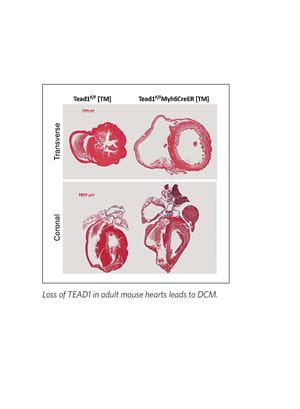Password Reset
Forgot your password? Enter the email address you used to create your account to initiate a password reset.
Forgot your password? Enter the email address you used to create your account to initiate a password reset.
UPMC Children’s Heart Institute cardiologist and researcher Mousumi Moulik, MBBS, was awarded a new National Institutes of Health (NIH) R01 grant in July to continue her studies on the TEAD1 transcription factor and its role in maintaining normal cardiac function. Past work by Dr. Moulik and colleagues was able to show in a murine knockout model that deletion of TEAD1 brings about a fatal dilated cardiomyopathy.
New Grant: Technical Details
The TEA domain transcription factors (TEAD1-4) act as transcriptional mediators of the organ size control Hippo kinase pathway by interacting with Hippo pathway regulated coactivators Yes-Associated Protein (YAP) and its paralogue WW Domain-containing transcription regulator protein (TAZ), and are known to regulate cellular proliferation, survival, oncogenesis, and stem cell maintenance and differentiation.
Dr. Moulik’s research team recently reported a critical, nonredundant role for TEAD1 in cardiomyocyte homeostasis and excitation-contraction coupling in the adult heart. Their data reveal that TEAD1 directly binds to promoter and enhancer regions of a network of genes involved in cardiac hypertrophic signaling and that multiple genes involved in cardiac hypertrophy are dysregulated upon cardiomyocyte-specific deletion of TEAD1. Mammalian cardiac muscle has minimal regenerative capacity and adapts to hemo-dynamic stress and injury primarily through cardiomyocyte hypertrophy and transcriptional reprogramming. This hyper-trophic remodeling is eventually maladaptive and a critical intermediate step for the development of heart failure.
At the molecular level, cardiac hypertrophy is regulated by a complex network of cross-talking signaling pathways and transcription factors. The Hippo pathway regulated TEAD1 transcriptional activity is critical for cardio-myocyte proliferation and homeostasis, but its role in cardiac hypertrophy and heart failure, though postulated, is less clear. Based on Dr. Moulik’s preliminary data and other published evidence, she hypothesizes that TEAD1 plays a regulatory role in physiologic cardiomyocyte hypertrophic growth and pathologic cardiomyocyte hypertrophic remodeling.
The broad goal of Dr. Moulik’s R01 is to mechanistically delineate key cardiomyocyte hypertrophy signaling pathways regulated by TEAD1 in the adult heart and its significance in growth and heart failure. Further, the study has three specific aims. The first is to determine the requirement of TEAD1 for cardiomyocyte hypertrophy during postnatal physiologic growth via regulation of the IGF1 and mTOR pathways. The second aim seeks to determine if TEAD1 regulates pathologic cardiomyocyte hypertrophy in pressure overload-induced cardiac remodeling and augments NFAT and MEF2 signaling. Finally, the study will investigate if TEAD1 regulates pathologic hypertrophy pathways and fetal gene program in human heart failure.
Dr. Moulik’s studies will critically address how TEAD1, the transcriptional target of the Hippo kinase pathway, regulates cardiomyocyte hypertrophy in physiologic and diseased states in the heart and translate this to pathologic cardiac hypertrophic remodeling in human heart failure. This research will further advance the understanding of the postnatal cardiac-specific role of the Hippo pathway, which is currently an active target for cardiac regeneration and novel cancer therapeutic strategies.

About Dr. Moulik
Mousumi Moulik, MBBS, is the director of the Pediatric Cardiovascular Genetics Clinic at UPMC Children’s Hospital of Pittsburgh, which opened in early 2018. Dr. Moulik came to Pittsburgh after spending 10 years at the University of Texas Health Science Center at Houston following the completion of her fellowship training at the Baylor College of Medicine.
Dr. Moulik’s clinical and research interests revolve around pediatric cardiomyopathies and their underlying molecular genetics. Since arriving at UPMC Children’s, Dr. Moulik completed planning and implementation for the Pediatric Cardiovascular Genetics Clinic. The goals of the clinic are to facilitate the genetic diagnosis of familial cardiac disorders and expand the use of that genetic diagnosis to the larger family unit to better understand who is at risk for developing the disease. In the future, the genetic information collected also will permit clinicians and researchers to perform genotype and phenotype correlation to predict risk profile and disease severity based on underlying genetic etiology and transition to treatment based on personalized precision medicine.
Dr. Moulik is very active on the research front in cardiovascular genetics and cardiac signaling in heart failure. Dr. Moulik’s research group previously uncovered the critical role of the transcription factor TEAD1 in maintaining normal cardiac function in the adult heart. Additionally, Dr. Moulik’s research laboratory has a focus on the role of the circadian clock in cardiac pathologic remodeling.
References and Further Reading
Liu R, Lee J, Kim BS, Wang Q, Buxton SK, Balasubramanyam N, Kim JJ, Dong J, Zhang A, Li S, Gupte AA, Hamilton DJ, Martin JF, Rodney GG, Coarfa C, Wehrens XH, Yechoor VK, Moulik M. TEAD1 is Required to Maintain Adult Cardio-myocyte Function, and Its Loss Results in Lethal Dilated Cardiomyopathy. JCI Insight. 2017 Sep 7; (2917). Pii:93343.